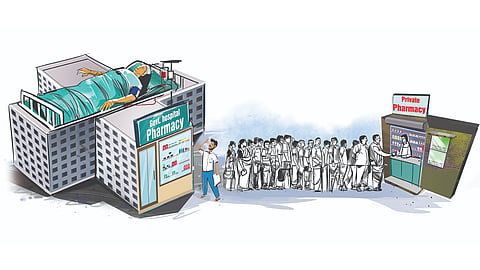

CHENNAI: In addition to economic hardships and the illness/disease wreaking havoc on their bodies and psyche, patients admitted in city’s government hospitals (GHs) face yet another hardship.
Drugs and many everyday essentials are not available at the pharmacy inside the hospital. So, attenders are often referred to pharmacies outside, for which they’re forced to pay from their own wallet.
While officials at the State Health Department claim there’s no drug shortage, another round of assessment and monitoring of their availability at GHs is need of the hour.
Dependent on private pharmacies
A visit to private pharmacies outside GHs in the city revealed that many patients of GHs depend on private pharmacies for medications, medical aid equipment and accessories.
“My wife is in emergency care because of abdominal pain. The hospital asked me to get a pregnancy test kit from the pharmacy outside the hospital. They’ve not even started on medications. I’m not sure if I’d have to get those also from the private pharmacy,” laments Mohan*, attender of a patient admitted to Kilpauk Medical College and Hospital.
Another patient’s kin were also waiting for a medicine given for vertigo at the private pharmacy outside the hospital since the right brand and dosage medicine was not available at GH. Brother of the patient said that they did not mind the cost of medicine in private sector but “there’s no other attendee with my brother. It’s inconvenient to go out each time we need anything.”
Another patient at Rajiv Gandhi Government General Hospital concurs, and adds: “For the past few days, I’ve been purchasing outside the hospital because of unavailability of basic equipment for dialysis. It’s expensive but I don’t have an option.”
Another patient attendee chimes in, “We admitted our brother for surgery around a week ago. Since then, we’ve been purchasing medicine from outside.”
Other essentials unavailable
Sadly, these are not isolated cases. Basic equipment, in addition to drugs, more often than not, remain out of stock at GHs.
Even doctors working at the GHs prescribe medicines and other essentials available at private pharmacies only. Some of these include pregnancy test kits, blood thinners, IV kits, tablets for hypertension, cardiac issues and diabetes, sodium bicarbonate tablets, supplements and others.
“Often, GHs will have only one specific quantity, such as 1 mg and patients might require 2 mg. So, they’d have to take double the number of tablets. The GHs can procure them at Jan Aushadi centres too for cheaper rates, narrates S Ramachandran, former secretary of Druggists and Chemists Association. “Attenders are often asked to buy generic drugs and even injections from outside. This also includes medications and injections, which are supposed to be free in all GHs for pregnant women.”
Demand exceeds supply
The imbalance between requirement and procurement is a huge problem, claim doctors. The incidence of non-communicable diseases (NCDs) has increased, but procurement has not yet caught up to demand.
“Lifestyle changes and genetic factors have led to an increasing incidence of NCDs. There have been a manifold increase in cases of hypertension, diabetes, cardiac problems, stroke and other medical issues in the recent times. Therefore, the requirement of drugs for these health problems has increased,” says Dr Narendra Nath Jena, senior consultant and HoD, Emergency Medicine, Meenakshi Mission Hospital and Research Center.
In small towns and districts, hospital nurses and healthcare workers buy these drugs and equipment on their own with the available funds.
“We go to a nearby private pharmacy and get the most commonly-used drugs there. Since the demand here is not very high and there are sufficient funds, we’re able to make sure patients are provided with the required medicines,” says a nurse from the Illuppur Government Hospital in Pudukottai. “But in major GHs, lack of funding is a serious problem. That’s why there isn’t enough stock of medicines and other medical essentials, and patients are asked to buy them from private players.”
Officials in denial
Meanwhile, officials at the State Health Department continue to claim that no GH in the State has run out of medicines.
“All required drugs are stocked in warehouses. However, it’s a possibility that hospitals may not have brought it from the warehouses. We have a stock of medicines for 3 months. Two months are within the pipeline and 1 month in quarantine. There are Rs 250 crore worth of drugs in 32 warehouses across the State,” explains Deepak Jacob, MD of Tamil Nadu Medical Services Corporation.
Even if ther prescribed medicine is not available, there are alternative drugs in stock, he states. “With COVID-19 scare, we’ve made sure to keep stock of every essential drug. We’ve placed an order for medicines that’d last 9 more months. No shortage of drugs has been reported for the past 6 months from any of the GHs,” he states.
Visit news.dtnext.in to explore our interactive epaper!
Download the DT Next app for more exciting features!
Click here for iOS
Click here for Android